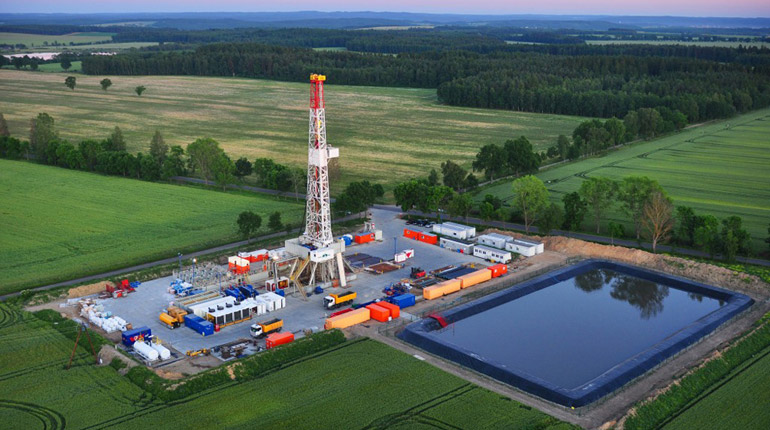Europe needs more gas, so should develop shale gas
 The EU must seize the opportunity of domestic shale gas to help meet its emissions goals and reduce its dependence on foreign suppliers. (3Legs Resources)
The EU must seize the opportunity of domestic shale gas to help meet its emissions goals and reduce its dependence on foreign suppliers. (3Legs Resources)
The following is a contributed article by Stephen Tindale, a climate and energy consultant and the co-founder of Climate Answers.
The EU regularly claims to be a world leader in combatting climate change. It is not. The United States is the world leader. President Barack Obama has told the Environmental Protection Agency to use its powers under the 1970 Clean Air Act to regulate coal more strictly: this regulation will include greenhouse gas emissions. Obama is able to do this because of the American shale gas revolution.
The EU regulates the electricity generation sector for toxic emissions such as sulphur dioxide, but not for greenhouse gas emissions. Its cap-and-trade scheme – the Emissions Trading System (ETS) – is supposed to deal with greenhouse gas emissions. But the cap for emissions has been too high and the resultant carbon price too low. Emissions from the EU28 have fallen since the introduction of the ETS in 2005, but as a result of the economic recession rather than any policy. The ETS has failed to be as effective as was hoped in reducing emissions.
So Europe is not leading in the reduction of emissions. In fact, in the power sector, it is going backwards. In 2010, 830 TWh (25% of the total electricity generated in the EU) came from coal and 798 TWh (24%) was from gas. In 2012 – the last year for which official figures are available, coal had increased its contribution to 902 TWh (27%) while gas had decreased to 615 TWh (19%). Since then, coal generation has continued to grow in Europe. Coal is about twice as damaging to the climate as gas is. The average figure for emissions from coal power stations is around 800 g of carbon dioxide equivalent per kWh, while from gas it is around 400 gCO2e/kWh.
This does not make gas low-carbon though. Nuclear power, wind and marine renewables all emit less than 50 gCO2e/kWh, and solar photovoltaics emit less than 100 gCO2e/kWh. However, gas remains less polluting than coal. It is also less polluting than oil, both for the climate and for air quality.
 Stephen Tindale is a climate and energy consultant. (Climate Answers)
Stephen Tindale is a climate and energy consultant. (Climate Answers)This is very relevant to the transport sector. Many European cities – including London, Paris and Rome – suffer from appalling levels of air pollution. Nitrogen dioxide emissions from diesel vehicles are causing significant pollution and health problems in several UK cities, including London. Governments face millions of pounds in fines if plans to tackle the emission problems are not put forward soon. Switching vehicles to gas would be an effective means of cutting pollution and protecting public health. All buses in the Indian capital Delhi run on gas. Some European cities, such as Madrid, also have gas buses. Other European cities should catch up.
In other sectors, gas is already dominant. Most of the heating in Europe comes from gas, and although demand from the sector is not expected to rise significantly in the short term, the region will continue to need it. Market tightness is a risk in key winter periods.
Gas is also needed as a back-up for intermittent renewables, but we need more of it if supply is to match demand. The question is what sort of gas, and from where? North Sea gas is one option, and the pipeline network for this is good. But there isn’t enough gas in the North Sea to supply all of Europe’s needs. In fact, beyond 2020, UK North Sea production is likely to decline. Problems with output from Groningen will continue to limit Dutch supply, and Norwegian output cannot make up the shortfall.
The EU imports a lot of gas: in 2014, two-thirds of all gas used was imported. Just over 30% of these imports came from Russia. In future, Europe is likely to be even more dependent on Russian gas and LNG. Much of the payment for Russian gas ends up in the Kremlin. So EU countries are funding President Vladimir Putin’s wars. Supplies from Algeria and Qatar ought to cause ethical concerns. Neither of these countries’ governments have much respect for human rights. They are at least less bad than the government of Azerbaijan. Nevertheless, the EU remains very keen to build pipelines to import Azeri gas.
The development of shale gas extraction in the EU would reduce our need for Russian, Azeri, Qatari and Algerian gas and LNG. Using indigenously produced shale gas also has environmental benefits. Shale gas from properly regulated sites has a lower carbon footprint than LNG. The climate impact of shale gas was comprehensively assessed in 2013 by David MacKay and Tim Stone of the UK’s Department for Energy and Climate Change. They concluded that:
MacKay and Stone emphasise fracking must be well regulated. Otherwise, methane will leak. Methane traps around 100% more heat in the atmosphere than carbon dioxide does over the first five years after release and 72% more over 20 years. However, methane does not last as long in the atmosphere, so over a longer period, the impact is less.
The UK Environment Agency has a good track record in regulating pollution, but needs to be adequately resourced. Like other public bodies in this age of austerity, it is having its resources reduced substantially. The UK government must now accept – and say publicly – that UK shale gas extraction will only be consistent with our climate obligations if it is overseen by a well-funded regulator. Fracking is not yet adequately regulated in the US, but the Obama administration is – somewhat belatedly – tightening the rules to restrict the amount of gas drillers can release into the air.
Will shale gas lock us into fossil fuel use? Not much more than we are already locked in. Fossil fuels will continue to be used for many decades. Gas is less harmful in climate terms, and is also a more efficient back-up fuel than coal is for intermittent renewables such as wind and solar power. The first climate priority is to stop burning coal. The second priority is to stop burning oil. Gas – including shale gas – can help speed this up.
Stephen Tindale is a climate and energy consultant and the co-founder of Climate Answers. Previously, he has been the Executive Director of Greenpeace UK and chair of the Greenpeace European Unit. He has also worked as an environment and policy advisor to the UK government and as a lecturer in Environmental Policy at Birkbeck College, University of London.



